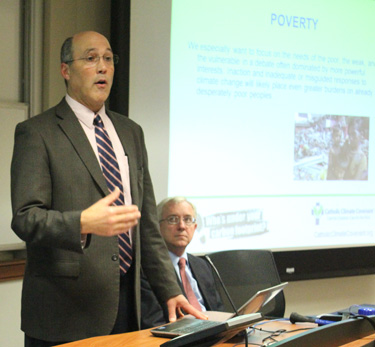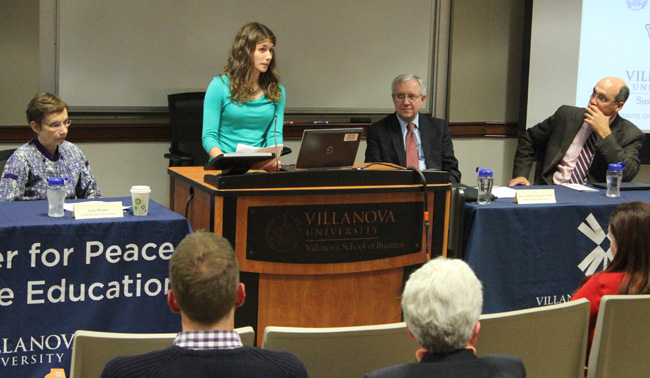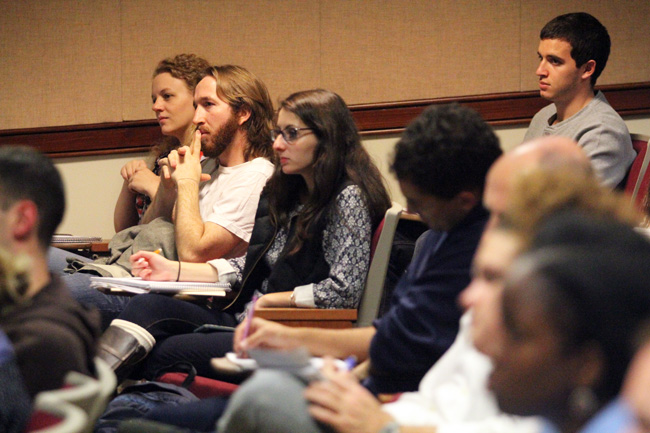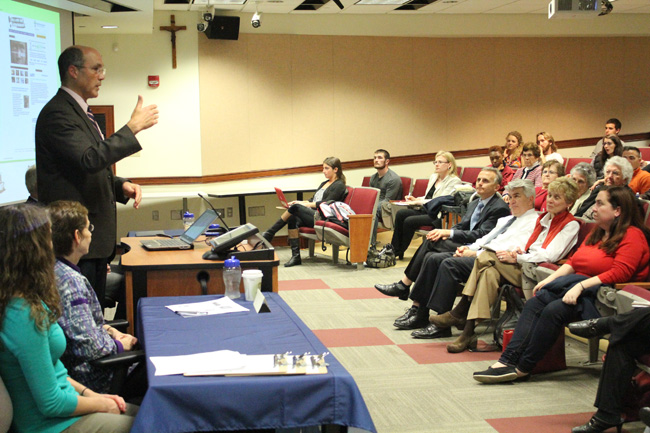Close to 40 people gathered at Villanova University Tuesday night, Nov. 11, for the “Faith and Environment Panel: Empowering the Care of Creation” in which three speakers discussed climate change in relation to faith, national security and poverty.
Daniel J. Misleh, the executive director of the Catholic Climate Covenant, alerted his audience to the church’s mission to care for creation. Misleh said he initially learned about climate change through his oldest child, and the subject interested him enough to study it further.
In 1990 Pope John Paul II issued a statement on climate change for that year’s World Day of Peace. The Catholic bishops of the United States also made comments on the subject in 2001 by emphasizing prudence and focusing on the environment’s effects on poverty.
[hotblock]
“It’s not new teaching,” Misleh said, “at least not on the environment.”
Misleh anticipates Pope Francis issuing an upcoming encyclical on climate change.
In his talk, Misleh said the poor usually provide the least carbon footprint yet endure the effects of climate change the most.
Ken Fleischer, who teaches a class titled “Faith, Reason and Culture” at Villanova, attended the talks and invited his students to write a paper on environmental ethics. He called climate change an ecological challenge.

Dan Misleh of the Catholic Climate Covenant speaks about Catholic teaching on climate change, the environment and global solidarity.
“It’s one of the issues that concerns me as an individual citizen of the planet,” said Fleischer, a member of St. Peter’s Episcopal Church in Great Valley, Chester County. “I’ve watched the impact. I’m concerned we’re leaving (the world) in worse shape than better.”
Rear Admiral David Titley, the founding director of the Center for Solutions to Weather and Climate Risk at Penn State University, spoke in his talk about the environment’s effect on national security.
He condensed his message into three simple points: It’s about people. It’s about water. It’s about change.
Titley said his military superiors initially asked him to get educated on the issue.
“If your boss is interested,” he said, “you are fascinated.”
The retired admiral, who said he is just one of a few senior military officers involved in climate change, noted the issue often appears “complex and abstract” but it’s important nonetheless because people can make a difference in the field.
He used animated graphics and charts to emphasize rising global temperatures. Due to escalating sea levels, Titley noted 3.7 million people in the United States are within three feet of high tide.
He said melting ice in the Arctic Ocean causes concern for the United States because other nations might attempt to claim waters and surrounding lands in the future, impacting the United States’ claims in Alaska.
Gaye Burpee, Catholic Relief Services’ senior adviser on climate change and rural livelihoods for Latin America and the Caribbean, spoke about climate change’s effects on agriculture in Central America. She said crop yields for maize and beans are expected to decrease because of climate change, caused by rising temperatures and less water for irrigation.
Burpee said climate change also produces more frequent, intense and damaging rains in Central America, which destroy or damage crops and the homes of farmers.
Liesel Schwarz, the sustainability manager for Villanova University and organizer for the panel discussion, said much talk today in the United States focuses on the economy but more emphasis should be put on the environment and its effect on the economy.
“We’re so insulated because of how developed we are,” Schwarz said.
Charlie Dugan, another attendee who has been interested in the topic for 15 years, said the seminar presented a lot of new information. He thought Burpee’s talk gave a detailed study.
Dugan said the seminar presented “good ideas on things that can be done to mitigate the effort of climate change on the poor.”
***
Brendan Monahan is a freelance writer in Plymouth Meeting and may be contacted at bmonahan16@gmail.com.
PREVIOUS: Program for families’ congress stays positive, doesn’t shy away from issues
NEXT: Students write 10,000 letters inviting Pope Francis to Philadelphia





I am a little disgusted that the Pope is expected to write an encyclical on climate change. Since when is he as religious person feel the need get involved in a political issue. This is about politics, redistribution of wealth, control, power and greed. The science is just not there. Catholics have really lost their way and with a Jesuit in charge I don’t expect they will come back. Sadly, this is not my Catholic Church. Please remove me from you e-mail listing immediately. Catherine Finnegan
I have been listening to the Climate Liberal Lies since the 1st Earth Day at Belmont Plateau. Then it was GLOBAL COOLING. Jacque Cousteau maritime friends spoke about the Oceans and warned about being able to walk to France from Philly because the seas would turn to molasses and harden. Then it was we were destroying the coral reefs off the Atlantic Coast. Environmentalist dump millions of tires to create an artificial for the fishes to play.OOPS That is now an environmental Catastrophe. the science was settled they claimed on all those events.
Then it was the OZONE. We stopped manufacturing CFC to close the hole we never realized was there ALWAYS! You guessed it the hole is still there..False Alarm.
Then it was Al Gore telling us Arctic would be ice free by 2012 Professor Mann of PSU proclaimed his Hockey Stick in Increased temperatures weather Patterns EXCEPT he has been in Court for more than a decade trying to not release the Raw data and logic for PEER REVIEW. hmmm Thats strange.. In 2014 the Arctic Ice cap is the largest and Thickest in History. Same goes with the South Pole. Environmentalist send Ozzies to South Pole In Summer to document there findings except they get stuck in Ice, meanwhile Russia and China Ice Brekers get stuck in ICE> USA who clears the North South Lanes for scientific and Supply Ships rescued the Environmentalist.
The Now Named Climate Change Liberal Environmentalist crew is just trying to Bully Their HOAX thru UN. They WANT Control.. Just Like They lied about TREES before You can’t cut them you can’t clear brush around Trees in late 1990’s early 2000’s until reality set in that older trees don’t cleanse CO2. The Younger trees thrived in CO2 by naturally growing deeper roots to compensate.
The Environmentalist RELIGION is mother nature. What they ultimately want is COMPLETE CONTROL.of our Lives!
The Environmentalist Climate Change computer models cannot take past history input real data and Predict the already KNOWN past. However they Call us Radical because we don’t embrace their UNTRUTHS!
The US Government declares CO2 a Pollutant that without it we would all DIE!
They declare a Minimal level of 400 PPM while our Lungs Contain over 40,000 PPM of CO2 . What a Quandry? Do we blame GOD for making us incorrectly? If this is a sin in Churches Eyes for Violating this UNJUST Regulation, and not rendering onto Caesar> WHO do we believe?
Imagine Jesus Christ was Lucky he didn’t live in 2014 in USA.
Save taxpayer’s money AND defund climate change and environmental destruction by ending the enormous subsidies and tax breaks for animal agriculture!
With 60+ BILLION food animals on the planet our best chance to mitigate climate change is to severely reduce consumption of animal foods. More than 1/3 of human induced warming is attributable to animal agriculture. Methane is 24 times more potent than CO2 but takes only 7 years to cycle out of the atmosphere. CO2 takes around 100 years to come out. Human pursuit of animal protein is the leading cause of methane release and a primary cause of CO2 concentrating in the atmosphere. Check the facts and act!
“As environmental science has advanced, it has become apparent that the human appetite for animal flesh is a driving force behind virtually every major category of environmental damage now threatening the human future: deforestation, erosion, fresh water scarcity, air and water pollution, climate change, biodiversity loss, social injustice, the destabilization of communities, and the spread of disease.” Worldwatch Institute, “Is Meat Sustainable?”
“If every American skipped one meal of chicken per week and substituted vegetables and grains… the carbon dioxide savings would be the same as taking more than half a million cars off of U.S. roads.” Environmental Defense Fund
“A 1% reduction in world-wide meat intake has the same benefit as a three trillion-dollar investment in solar energy.” ~ Chris Mentzel, CEO of Clean Energy
There is one single industry destroying the planet more than any other. But no one wants to talk about it.